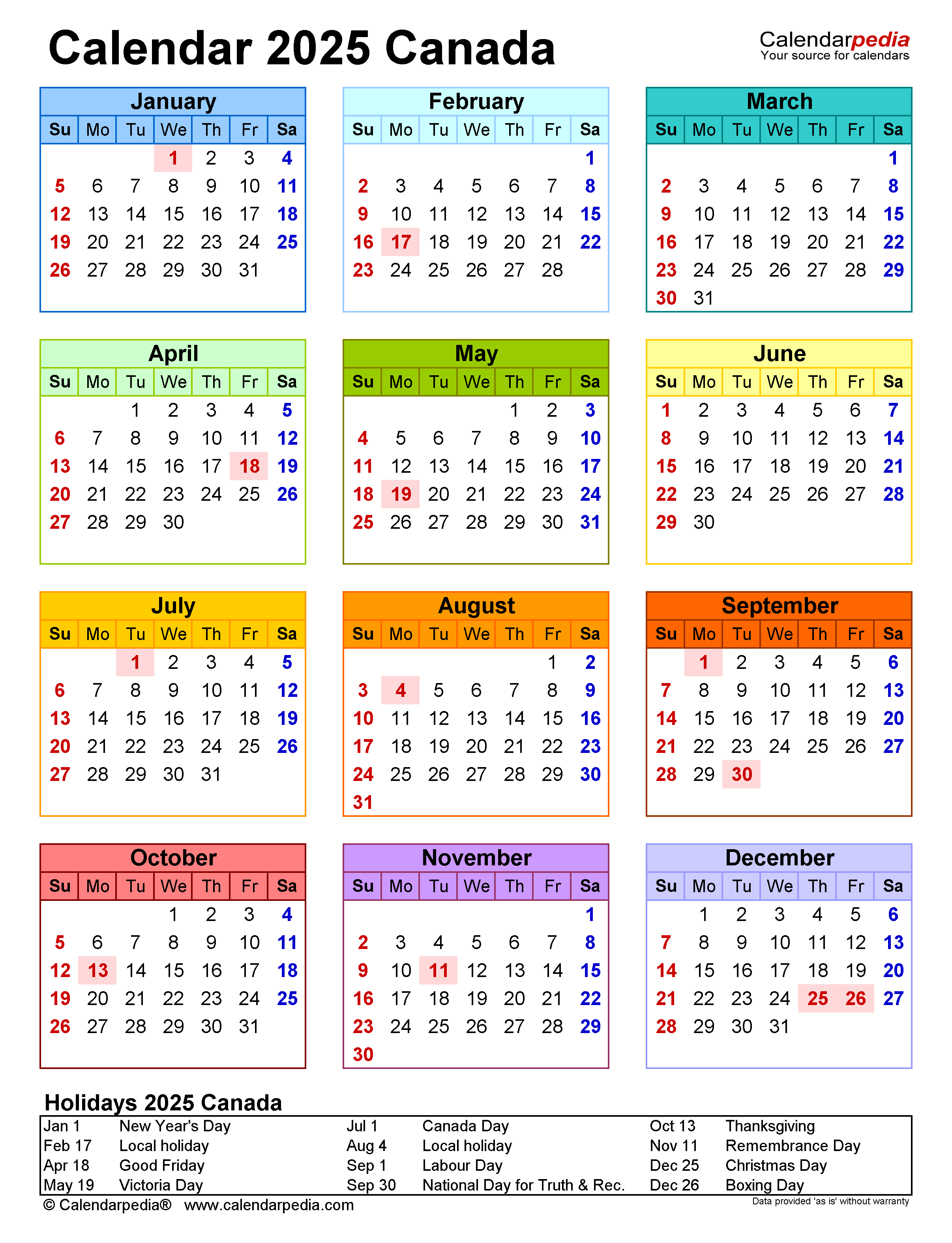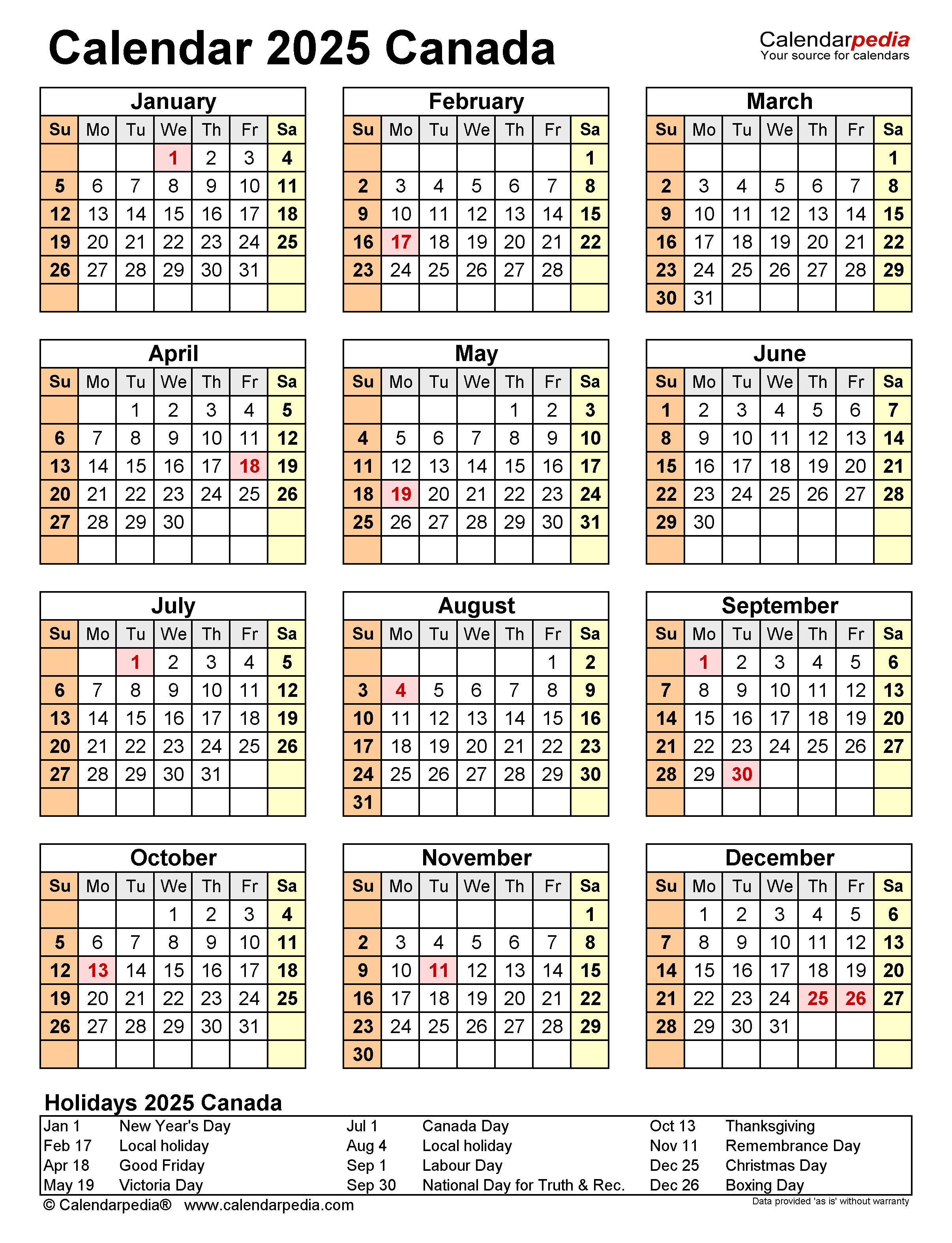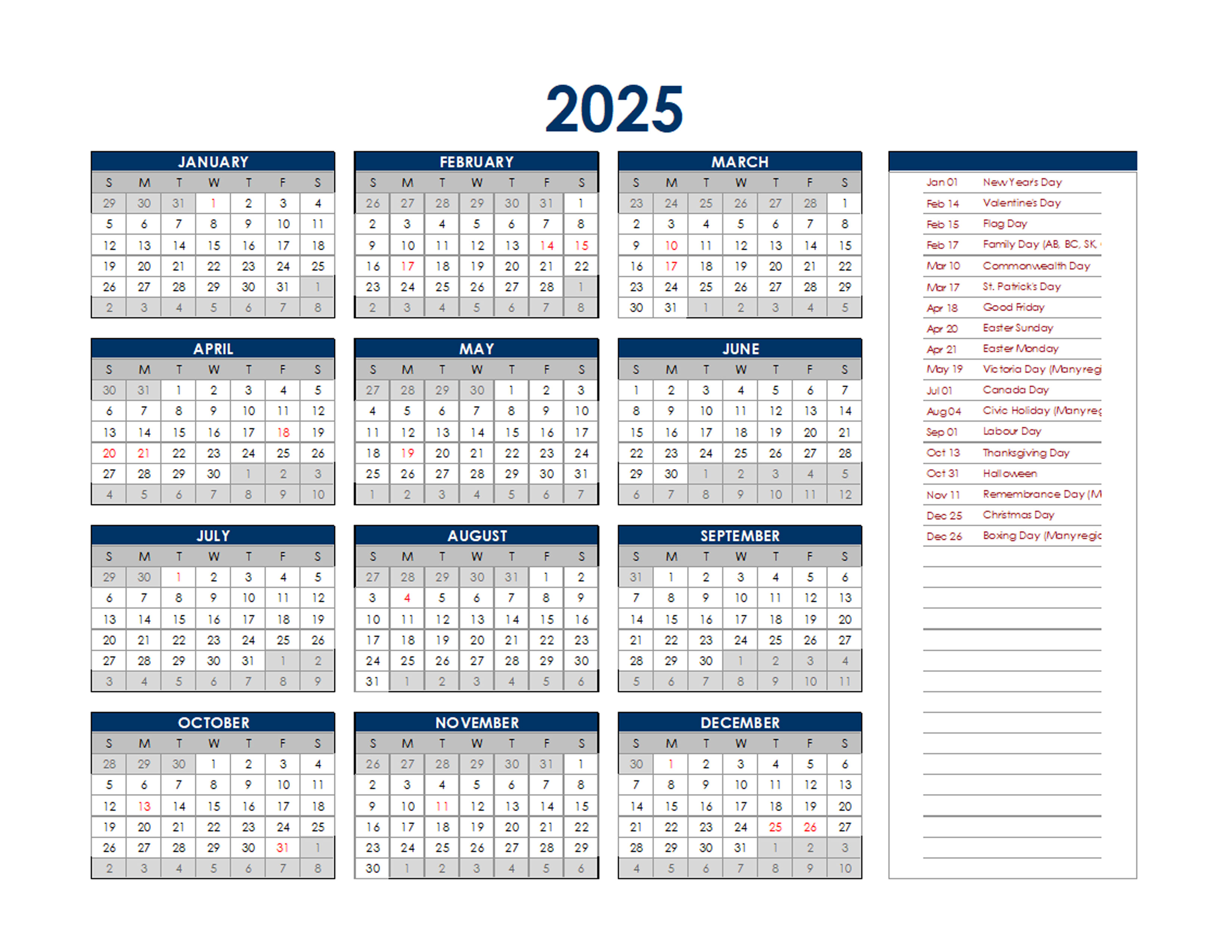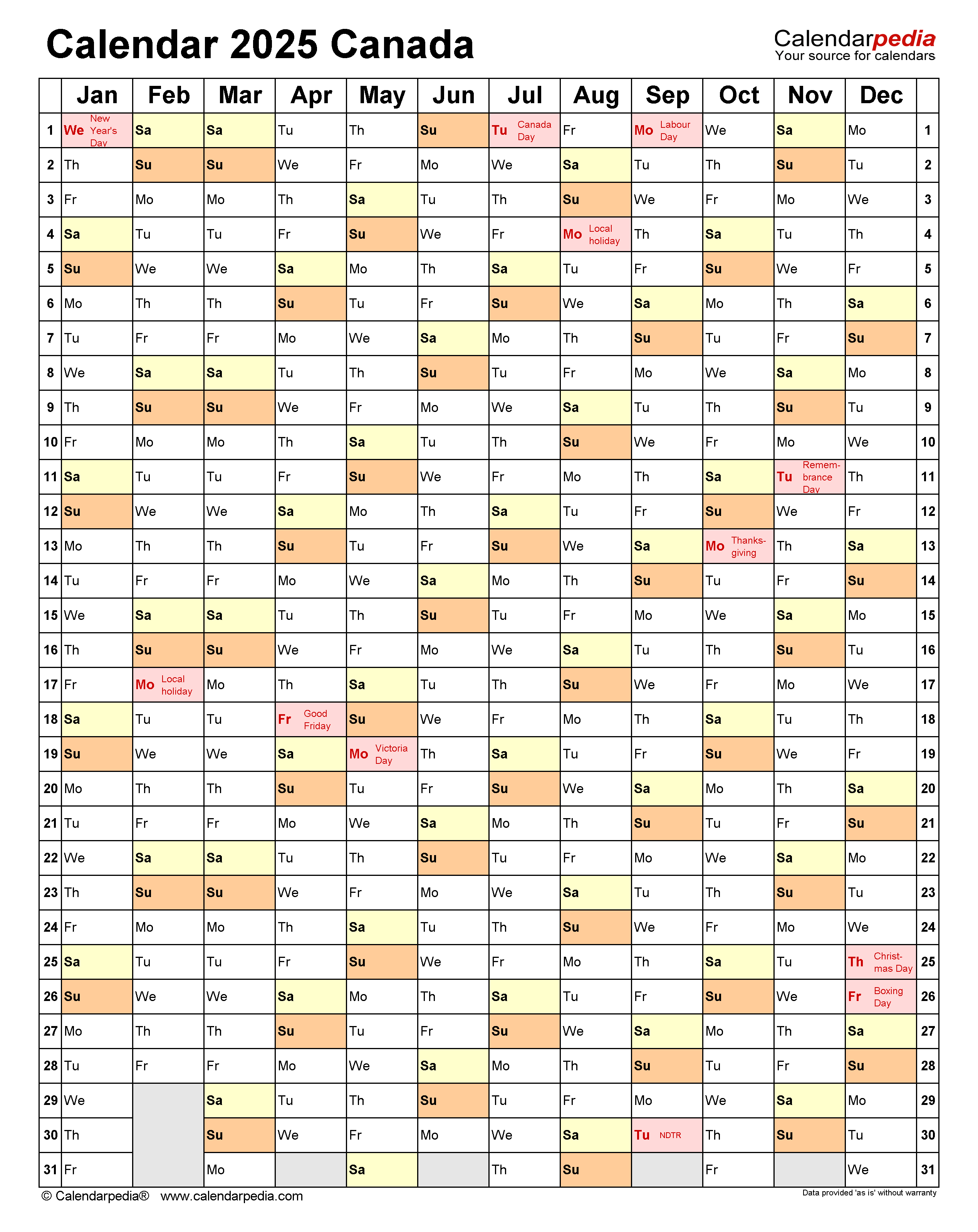Navigating Canadian Holidays in 2025: A Comprehensive Guide
Related Articles: Navigating Canadian Holidays in 2025: A Comprehensive Guide
Introduction
In this auspicious occasion, we are delighted to delve into the intriguing topic related to Navigating Canadian Holidays in 2025: A Comprehensive Guide. Let’s weave interesting information and offer fresh perspectives to the readers.
Table of Content
Navigating Canadian Holidays in 2025: A Comprehensive Guide

Canada’s diverse cultural tapestry is beautifully reflected in its rich tapestry of holidays. From national celebrations commemorating historical events to religious observances and cultural festivals, these occasions provide opportunities for Canadians to connect with their heritage, foster a sense of national identity, and enjoy shared moments of festivity. Understanding the nuances of these holidays is essential for navigating the calendar year effectively and appreciating the unique character of Canadian culture.
2025: A Glimpse into the Canadian Holiday Landscape
The year 2025 promises a vibrant calendar filled with diverse holidays, each offering a unique perspective on Canada’s history and values. Here’s a detailed breakdown of key holidays in 2025:
January:
- New Year’s Day (January 1): This marks the beginning of the new year and is a time for reflection, resolutions, and fresh starts. It is a statutory holiday in all provinces and territories, providing an opportunity for Canadians to unwind and enjoy time with loved ones.
- Family Day (Third Monday in January): While the exact date varies by province, Family Day is dedicated to celebrating the importance of family and community. This holiday encourages Canadians to spend quality time with their loved ones, fostering strong familial bonds.
February:
- Valentine’s Day (February 14): This day celebrates love and affection, providing an opportunity to express appreciation for loved ones through gifts, gestures, and heartfelt messages. While not a statutory holiday, it is widely observed and celebrated across Canada.
- Louis Riel Day (February 18): Observed in Manitoba, this day commemorates the life and legacy of Louis Riel, a significant figure in the history of Métis people in Canada. His contributions to the development of the Métis nation and his fight for their rights are acknowledged and celebrated on this day.
March:
- St. Patrick’s Day (March 17): While not a statutory holiday, St. Patrick’s Day is widely celebrated across Canada, particularly in areas with strong Irish heritage. This day is marked by parades, traditional music, and festivities, celebrating Irish culture and heritage.
April:
- Good Friday (April 18): This Christian holiday commemorates the crucifixion of Jesus Christ. It is a statutory holiday in all provinces and territories, allowing for reflection and contemplation.
- Easter Monday (April 21): This holiday, observed in many provinces and territories, follows Good Friday and marks the resurrection of Jesus Christ. It is a time for celebrating new beginnings and the hope associated with Easter.
May:
- Victoria Day (Monday before May 25): This holiday commemorates the birthday of Queen Victoria, a significant figure in Canadian history. It is a statutory holiday across Canada, providing a long weekend for Canadians to enjoy outdoor activities and celebrate the arrival of spring.
June:
- Canada Day (July 1): This national holiday celebrates the anniversary of Canadian Confederation in 1867. It is a statutory holiday in all provinces and territories, marked by parades, fireworks, and various festivities across the country. It is a day to celebrate Canadian identity, history, and achievements.
- National Indigenous Peoples Day (June 21): This day celebrates the heritage, cultures, and achievements of First Nations, Inuit, and Métis peoples in Canada. It is a day for reflection, education, and reconciliation, promoting understanding and respect for Indigenous communities.
July:
- Canada Day (July 1): As previously mentioned, this day marks the anniversary of Canadian Confederation and is a significant national holiday.
August:
- Civic Holiday (First Monday in August): This holiday, also known as "Simcoe Day" in Ontario, is a statutory holiday in most provinces and territories. It provides a day for local celebrations, community events, and leisure activities.
September:
- Labour Day (First Monday in September): This holiday is dedicated to celebrating the contributions of workers and the importance of labor unions. It is a statutory holiday in all provinces and territories, providing an opportunity for Canadians to relax and enjoy a long weekend.
October:
- Thanksgiving Day (Second Monday in October): This national holiday is a time for Canadians to express gratitude for their blessings and to celebrate the harvest. It is a statutory holiday in all provinces and territories, offering a long weekend for families to gather and enjoy a traditional Thanksgiving feast.
November:
- Remembrance Day (November 11): This day commemorates the sacrifices of Canadian soldiers who fought and died in wars. It is a statutory holiday in all provinces and territories, marked by ceremonies, parades, and moments of silence to honor the fallen.
December:
- Christmas Day (December 25): This Christian holiday celebrates the birth of Jesus Christ. It is a statutory holiday in all provinces and territories, observed by many Canadians as a time for family gatherings, gift-giving, and festive celebrations.
- Boxing Day (December 26): This holiday, observed in most provinces and territories, follows Christmas Day and is a time for giving gifts to those in need and enjoying the festive spirit.
Beyond Statutory Holidays: Cultural Celebrations and Observances
Beyond these statutory holidays, Canada’s diverse population ensures a rich tapestry of cultural celebrations and observances throughout the year. These include:
- Diwali (Festival of Lights): Celebrated by Hindus, Sikhs, and Jains, Diwali is a festival of lights, symbolizing the triumph of good over evil.
- Lunar New Year: This festival is celebrated by many Asian cultures, marking the beginning of a new year according to the lunisolar calendar.
- Ramadan: This Islamic holy month involves fasting during daylight hours and is a time for spiritual reflection and self-improvement.
- Eid al-Fitr: This Islamic festival marks the end of Ramadan and is celebrated with feasts and gatherings.
- Eid al-Adha: This Islamic festival commemorates the willingness of Prophet Ibrahim to sacrifice his son. It is celebrated with animal sacrifices and feasts.
- Hanukkah: This Jewish festival celebrates the rededication of the Second Temple in Jerusalem and is marked by the lighting of candles on a menorah.
These cultural celebrations enrich Canada’s social fabric, fostering understanding, tolerance, and appreciation for the diversity that defines the nation.
FAQs: Demystifying Canadian Holidays
Q: Are all statutory holidays observed nationwide in Canada?
A: While most statutory holidays are observed across the country, some provinces and territories have unique holidays or observe certain holidays differently. For example, Louis Riel Day is only observed in Manitoba, and Family Day is observed in various provinces on different dates.
Q: What is the significance of Victoria Day in Canada?
A: Victoria Day commemorates the birthday of Queen Victoria, who reigned over the British Empire during a period of significant growth and expansion, including Canada. This holiday reflects Canada’s historical ties to the British monarchy and its evolution as a nation.
Q: What are the origins of Thanksgiving Day in Canada?
A: Thanksgiving Day in Canada has its roots in the harvest festivals celebrated by Indigenous peoples across the country. The modern holiday was officially proclaimed by the Canadian government in 1879 and is now a time for gratitude and celebration of the harvest.
Q: How is Remembrance Day observed in Canada?
A: Remembrance Day is a solemn occasion marked by ceremonies, parades, and moments of silence to honor the sacrifices of Canadian soldiers who fought and died in wars. The poppy, a symbol of remembrance, is worn by many Canadians during this period.
Q: What are some of the unique cultural celebrations observed in Canada?
A: Canada’s diverse population ensures a rich tapestry of cultural celebrations throughout the year. These include Diwali, Lunar New Year, Ramadan, Eid al-Fitr, Eid al-Adha, and Hanukkah, each representing the traditions and values of different communities across the country.
Tips for Navigating Canadian Holidays:
- Stay informed: Familiarize yourself with the dates and significance of upcoming holidays, both national and cultural.
- Respect diversity: Recognize and appreciate the cultural significance of holidays observed by different communities in Canada.
- Plan ahead: If traveling or attending events, plan your schedule accordingly, considering potential travel disruptions or business closures.
- Embrace the festive spirit: Participate in local events, celebrate with loved ones, and enjoy the unique traditions and customs associated with each holiday.
- Show appreciation: Express gratitude for the contributions of individuals and communities, particularly during holidays like Thanksgiving and Labour Day.
Conclusion: A Tapestry of Celebration and Unity
Canadian holidays, both statutory and cultural, offer a unique lens through which to understand the country’s history, values, and diverse population. By celebrating these occasions, Canadians not only honor their past but also foster a sense of national identity and unity, embracing the rich tapestry of cultures that make Canada a vibrant and dynamic nation. As we navigate the calendar year, let us appreciate the significance of these holidays, recognizing their role in shaping the Canadian experience and fostering a sense of shared identity.








Closure
Thus, we hope this article has provided valuable insights into Navigating Canadian Holidays in 2025: A Comprehensive Guide. We thank you for taking the time to read this article. See you in our next article!